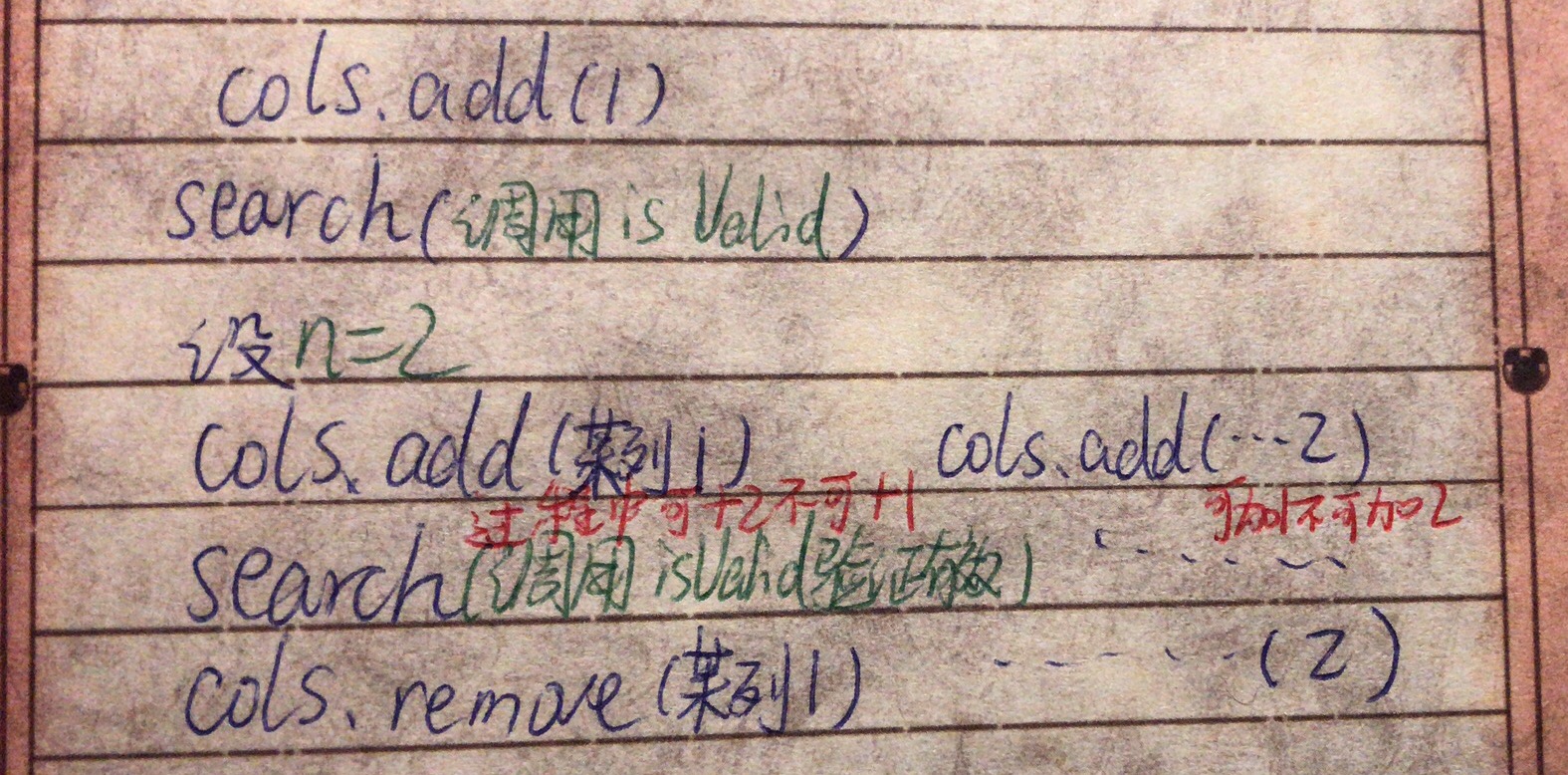[抄题]:
n皇后问题是将n个皇后放置在n*n的棋盘上,皇后彼此之间不能相互攻击。
给定一个整数n,返回所有不同的n皇后问题的解决方案。
每个解决方案包含一个明确的n皇后放置布局,其中“Q”和“.”分别表示一个女王和一个空位置。
对于4皇后问题存在两种解决的方案:
[
[".Q..", // Solution 1
"...Q",
"Q...",
"..Q."],
["..Q.", // Solution 2
"Q...",
"...Q",
".Q.."]
]
[思维问题]:
看不懂特殊情况:主要是要区别x y
[一句话思路]:
DFS去掉特殊情况后画图
[输入量]:空: 正常情况:特大:特小:程序里处理到的特殊情况:异常情况(不合法不合理的输入):
[画图]:

[一刷]:
- search函数可以是空类型,不返回search函数,返回其中的results即可。cols链表是后续函数的参数,此处需要新建链表。
- 如果辅助链表cols满了,需要在结果数组中添加画图,之后直接返回results。cols是数组,画成图才是链表
- drawCheesboard方法中,需要新建一个chessboard数组,作为最后返回的结果。 sb.append(j == cols.get(i) ? 'Q' : '.');表示j如果到达x有值处就打印Q
- 判断函数要有默认的return true 此函数判断的是cols,column是否有效,因此全部行通过后返回true
[二刷]:
[三刷]:
[四刷]:
[五刷]:
[五分钟肉眼debug的结果]:
[总结]:
search函数用的DFS回溯是关键
[复杂度]:Time complexity: O(分支的深度次方) Space complexity: O(分支*深度)
[英文数据结构或算法,为什么不用别的数据结构或算法]:
DFS:找出全部方法
[其他解法]:
[Follow Up]:
[LC给出的题目变变变]:
Nqueen第二版,改参数不行 暂时算了吧
[代码风格] :
- 规律:返回值和函数类型是相同的

class Solution { /** * Get all distinct N-Queen solutions * @param n: The number of queens * @return: All distinct solutions * For example, A string '...Q' shows a queen on forth position */ List<List<String>> solveNQueens(int n) { List<List<String>> results = new ArrayList<>(); if (n <= 0) { return results; } search(results, new ArrayList<Integer>(), n); return results; } /* * results store all of the chessboards * cols store the column indices for each row */ private void search(List<List<String>> results, List<Integer> cols, int n) { if (cols.size() == n) { results.add(drawChessboard(cols)); return; } for (int colIndex = 0; colIndex < n; colIndex++) { if (!isValid(cols, colIndex)) { continue; } cols.add(colIndex); search(results, cols, n); cols.remove(cols.size() - 1); } } private List<String> drawChessboard(List<Integer> cols) { List<String> chessboard = new ArrayList<>(); for (int i = 0; i < cols.size(); i++) { StringBuilder sb = new StringBuilder(); for (int j = 0; j < cols.size(); j++) { sb.append(j == cols.get(i) ? 'Q' : '.'); } chessboard.add(sb.toString()); } return chessboard; } private boolean isValid(List<Integer> cols, int column) { int row = cols.size(); for (int rowIndex = 0; rowIndex < cols.size(); rowIndex++) { if (cols.get(rowIndex) == column) { return false; } if (rowIndex + cols.get(rowIndex) == row + column) { return false; } if (rowIndex - cols.get(rowIndex) == row - column) { return false; } } return true; } }
